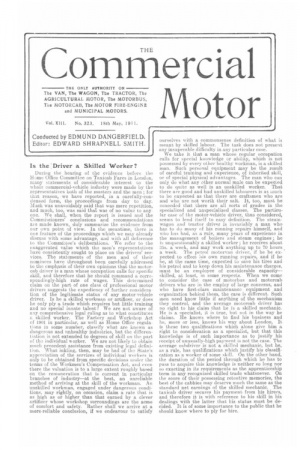Is the Driver a Skilled Worker?
Page 1

If you've noticed an error in this article please click here to report it so we can fix it.
During the hearing of the evidence before the Home Office Committee on Taxicab Ifares in London, many statements of considerable interest to the whole commercial-vehicle industry were made by the representatives both of the masters and the men ; for that reason, we have reported, in a carefully-condensed form, the proceedings from day to day. Much was unavoidably said that was mere repetition, and much, too, was said that was of no value to anyone. We shall, when the report is issued and the Commissioners' conclusions and recommendations ate made known, duly summarize the evidence from our own point of view. In the meantime, there is one feature of the proceedings which we may already discuss with some advantage, and with all deference to the Committee's deliberations. We refer to the exaggerated value which the men's representatives have consistently sought to place on the drivers' services. The statements of the men and of their nominees have throughout been carefully addressed to the eniph,asis of their own opinions that the motorcab driver is a man whose occupation calls for specific skill, and therefore that he should command a correspondingly-high rate of wages. This determined claim on the part of one class of professional motor drivers suggests the expediency of further consideration of the legitimate status of any motor-vehicle driver. Is he a skilled workman or artificer, or does he only ply a trade which requires but little training and no special innate talent ? We are not aware of any comprehensive legal ruling as to what constitutes a skilled worker. The Factory and Workshop Act of 1901 in particular, as well as Home Office regulations in some number, classify what are known as dangerous and unhealthy industries, but the differentiation is not extended to degrees of skill on the part of the individual orker. We are not likely to obtain much precedent assistance from existing legal definition. What inkling, then, may be had of the State's appreciation of the services of individual workers is only to be obtained from specific decisions tinder the terms of the Workmen's Compensation Act, and even there the valuation is to a large extent roughly based on the remuneration that is current in particular branches of industry—at the best, an unreliable method of arriving at the skill of the workman. Ail unskilled workman, engaged under dangerous conditions, may rightly, on occasion, claim a rate that is as high as or higher than that earned by a clever artificer whose workshop surroundings are the acme of comfort and safety. Rather shall we arrive at a more-reliable conclusion, if we endeavour to satisfy
ourselves with a commonsense definition of what is meant by skilled labour. The task does not present any insuperable difficulty in any particular case.
We take it that a man whose regular occupation calls for special knowledge or ability, which is not possessed by every other healthy workman, is a skilled man. Such personal equipment may be the result of careful training and experience, of inherited skill, or of special physical advantages. The man who can only do what any other normal male can be expected to do quite as well is an unskilled worker. That there are good and bad unskilled labourers is as much to be expected as that there are craftsmen who are and who are not worth their salt. It, too, must be conceded that there are all sorts of grades in the specialized and anspecialized classes. The particular case of the motor-vehicle driver, thus considered, seems to lend itself to easy definition. The steamwagon and tractor driver is invariably a man who has to do many of his running repairs himself, and who has had, as a rule, many years of experience in the management of boilers and steam engines;. he is unquestionably a skilled worker ; he receives about Ms. a week, and may work anything up to 70 hours a week. The petrol motorvan driver, if he be expected to effect his own running repairs, and if he be, at the same time, expected to save his tires and his petrol and to keep down his maintenance charges, must be art employee of considerable capacity— skilled, at least, in some respects. When we come to consider the case of motorbus and motorcab drivers who are in the employ of large concerns, and who have first-class maintenance equipment and organization behind them, the case is different. Such men need know little if anything of the mechanism they control, and the average motorcab driver has no right to his claim that he is a skilled mechanic. He is a specialist, it is true, but not in the way he claims. He knows where to find his business and he, more or less, knows his way about London. It is these two qualifications which alone give him a right to consideration as a specialist, but that this knowledge is of such importance as to justify his receipt of unusually-high payment is not the case. The average cabdriver is not a skilled mechanic, but he, as a rule, has qualifications which justify his classification as a worker of some skill. On the other hand, the duration of the period through which he has to pass to acquire this knowledge is neither so long nor so exacting in its requirements as the apprenticeship term in any recognized skilled trade whatsoever. On the score of their possessing retentive memories, the best of the cabbies may deserve much the same as the standard net earnings of the skilled mechanic. The taxicab driver secures his payment from his hirers, and therefore it is with reference to his skill in his dealings with the latter that his status must be decided. It is of some importance to the public that he should know where to ply for hire.


























